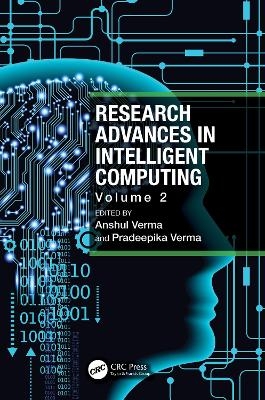
Research Advances in Intelligent Computing
CRC Press (Verlag)
978-1-032-56116-5 (ISBN)
Researchers and scientists have invested a great deal of effort into developing computers and other devices to be more capable of doing a wider range of tasks. As a result, the potential of computers to do a wide range of tasks in different environments, at varying speeds, and in smaller forms is growing dramatically every day. Currently, there is a race to create robots or computers with human-level intelligence. Artificial Intelligence (AI) is the ability of a machine or software to think like a human being. The study of the human brain, specifically how humans learn, make decisions, and react when trying to solve issues, is the basis of AI. The creation of intelligent software and systems, or intelligent computing (IC), is the outcome of AI studies. An IC system can perceive, reason, learn, and use language. In IC systems, AI and other cutting-edge techniques are employed to create system intelligence. IC has been applied to almost every area of computer science, including networking, software engineering, gaming, robotics, expert systems, natural language processing, computer vision, image processing, and data science. In modern times, IC is also employed to tackle a wide range of challenging issues in numerous disciplines, such as weather forecasting, agriculture science, medicine, and economics. This book offers the most recent advancements in both IC and AI for all these reasons.
Dr. Anshul Verma received M.Tech. and Ph.D. degrees in Computer Science & Engineering from ABV-Indian Institute of Information Technology and Management Gwalior, India. He has done Post-doctorate from Indian Institute of Technology Kharagpur, India. Currently, he is serving as Assistant Professor in Department of Computer Science, Institute of Science, Banaras Hindu University Varanasi, India. He has also served as faculty member in Computer Science & Engineering Department at Motilal Nehru National Institute of Technology (MNNIT) Allahabad and National Institute of Technology (NIT) Jamshedpur, India. His research interests include IoT, Mobile ad-hoc networks, Distributed systems, Formal verification, and Mobile computing. He is serving as Editor of the Journal of Scientific Research of the Banaras Hindu University. Dr. Pradeepika Verma received her Ph.D. degree in Computer Science and Engineering from the Indian Institute of Technology (ISM) Dhanbad, India. She has received M.Tech in Computer Science and Engineering from Banasthali University, Rajasthan, India. Currently, she is working as a Faculty Fellow in Technical Innovation Hub at Indian Institute of Technology, Patna, India. She has worked as a Post-Doctoral Fellow in Department of Computer Science and Engineering at Indian Institute of Technology (BHU), Varanasi, India. She has also worked as an Assistant Professor in the Department of Computer Science and Engineering at Pranveer Singh Institute of Technology, Kanpur, India, and as a Faculty Member in the Department of Computer Application at the Institute of Engineering and Technology, Lucknow, India. Her current research interests include natural language processing, optimization approaches, information retrieval and Mobile ad-hoc networks.
List of Contributors. Preface. Acknowledgements. 1. A New Range Selection Method For Global Best Worst Particle Swarm Optimization. 2. Automatic Speech Recognition For The Cleft Patients Using Deep Learning Techniques. 3. Dynamics of Underwater Acoustic Signal Processing: An Underwater Acoustic Marine Habitat Monitoring Application Perspective. 4. Visual Question Answering VGA on Radiology Image - A Survey of Methods And Techniques. 5. A Comparative Approach For Speech Emotion Recognition Using CNN And Branch CNN. 6. Revolutionizing Agriculture: A Comprehensive Review of Artificial Intelligence Techniques In Farming. 7. Prediction of Vitiligo Skin Disease Spreading Rate by Image Processing. 8. A Comparative Analysis of Different Approaches to Lexical and Semantic Document Similarity. 9. Artificial Intelligence In Banking And Financial Services. 10. Healthcare Applications on Federated Deep Learning For Cyber Security In The Internet of Things. 11. Prediction of Suicidal Risk Using Machine Learning Models. 12. Information Extraction And Summarization of Medical Reports Using Textract And GPT-2. 13. A Comparative Study on Prediction of Soil Health and Crop Recommendation Using Machine Learning Models. 14. Marine Soundscape Source Separation In The Indian Ocean Region (IOR) Soundscape Using Unsupervised Machine Learning.
| Erscheinungsdatum | 02.08.2024 |
|---|---|
| Zusatzinfo | 32 Tables, black and white; 75 Line drawings, black and white; 7 Halftones, black and white; 82 Illustrations, black and white |
| Verlagsort | London |
| Sprache | englisch |
| Maße | 156 x 234 mm |
| Gewicht | 517 g |
| Themenwelt | Mathematik / Informatik ► Informatik ► Software Entwicklung |
| Informatik ► Theorie / Studium ► Künstliche Intelligenz / Robotik | |
| Technik ► Elektrotechnik / Energietechnik | |
| Technik ► Umwelttechnik / Biotechnologie | |
| ISBN-10 | 1-032-56116-5 / 1032561165 |
| ISBN-13 | 978-1-032-56116-5 / 9781032561165 |
| Zustand | Neuware |
| Informationen gemäß Produktsicherheitsverordnung (GPSR) | |
| Haben Sie eine Frage zum Produkt? |
aus dem Bereich


